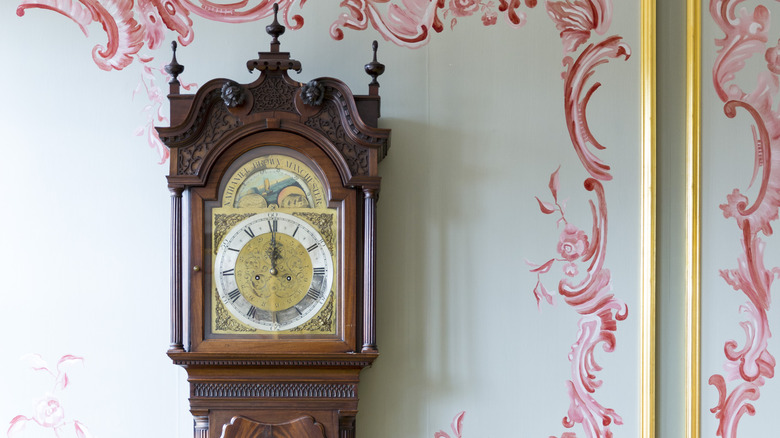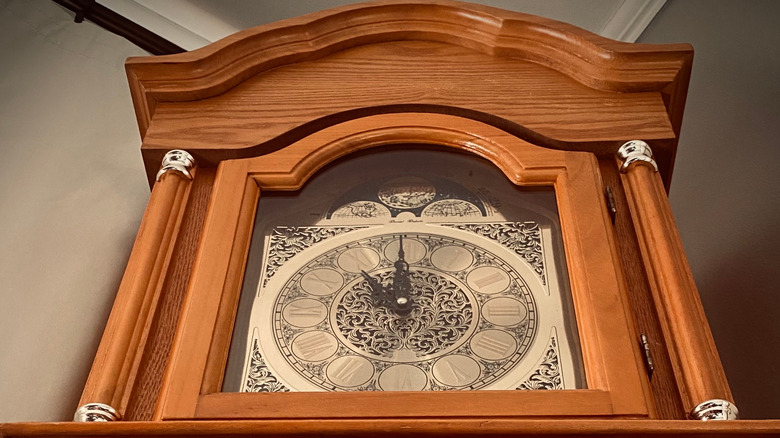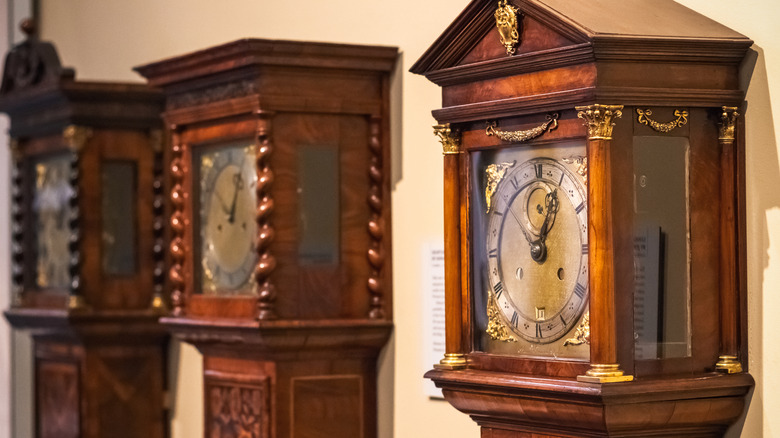How Did Grandfather Clocks Get Their Name?
Grandfather clocks are beautiful, elaborate machines, and they have a long history. According to The Galileo Project, it was the legendary Galileo Galilei who dreamed up the concept of a device that used a pendulum to keep time precisely, a feat with which humanity had struggled for centuries. ThoughtCo states that he began investigating the motion of pendulums in around 1582, but a pendulum clock remained another of his brilliant, unfinished ideas.
It was in 1656, ThoughtCo goes on, that Christian Huygens built the first pendulum clock, and it was reportedly the most accurate clock recorded at the time. Through centuries of refinement and the work of other brilliant pioneers in the field, the magnificent grandfather clock was born. According to Control Systems magazine, grandfather clocks were made possible by Robert's Hooke's invention of the anchor escapement (circa 1657), a crucial component that allowed longer pendulums, with less sweeping swings, to fit within a long case. These tall clocks came to be known as grandfather clocks, thanks to the 19th century song "My Grandfather's Clock."
The fascinating story of one hotel's grandfather clock
According to Mental Floss, "My Grandfather's Clock" was released in 1876, and was so popular that it changed the name of long-case clocks forever. The song was written by Henry Work, The Clock Depot claims, after hearing the tale of a particular grandfather clock at a British hotel.
According to the story, the George Hotel, owned and operated by the Jenkins Brothers, housed such a floor clock (as they were known then) in its lobby. It kept time accurately and faithfully until one of the Jenkins brothers died. It then started to lose time and become more and more inaccurate, confounding any who attempted to repair it or rectify the problem. The other brother died at 90 years old, it's said, and the clock stopped entirely at that very moment. Henry Work supposedly visited the hotel later, admired the clock and was told the story, which became the basis for the song "My Grandfather's Clock." (Johnny Cash's cover is posted on YouTube.)
The song is told from the perspective of a grandchild, and begins, per The Clock Depot, ""My grandfather's clock was too tall for the shelf, so it stood 90 years on the floor." It then launches into the story: "It was bought on the morn on the day that he was born. It was always his treasure and pride. But it stopped short, never to go again, when the old man died."
My Grandfather's Clock was a huge hit
As Phrases states, this is where grandfather clocks got their name, though these mighty timepieces are technically named longcase clocks. It seems that the touching song didn't just inspire this name, either, but two more.
Britannica says that a pendulum clock should be between six and seven-and-a-half feet tall to qualify as a grandfather clock. Phrases adds that longcase clocks that aren't so tall (not-so-long-case clocks, perhaps) have been deemed grandmother clocks, and those that are smaller still are sometimes referred to as granddaughter clocks. The only reason for this seems to be by extension of the original name. Granddaughter clocks stand no taller than 5' 2", it seems, to qualify, while grandmother clocks should be below six feet in height.
Whether the tale of the history of the George Hotel's clock is true or not (the hotel's website proudly shares the legend and the fact that it's still there), there's no denying just how influential "My Grandfather's Clock" was. According to David Nicholls' "The Cambridge History Of American Music," it was perhaps Work's biggest success, scoring around 800,000 sales.
The song, Nicholls writes, relays a poignant tale and "affirms the value of hard work, materialism, timeliness [and] family, home and religious values." These values are held dear by grandparents around the world, and there could be no more appropriate origin for the clock's name.


